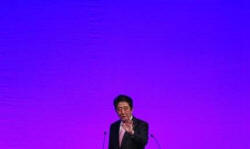|
 Japan
to turn over sensitive nuclear stockpile to United States Japan
to turn over sensitive nuclear stockpile to United States
 Send a link to a friend
Send a link to a friend
[March 24, 2014]
THE HAGUE (Reuters) — Japan will
turn over a stockpile of hundreds of kilograms of sensitive nuclear
material to the United States to be downgraded and disposed of, the two
countries' leaders said ahead of a nuclear security summit on Monday.
|
|
 U.S. President Barack Obama and Japanese Prime Minister Shinzo Abe
said in a joint statement that all highly enriched uranium and
separated plutonium would be removed from the Fast Critical Assembly
at the Japan Atomic Energy Agency. U.S. President Barack Obama and Japanese Prime Minister Shinzo Abe
said in a joint statement that all highly enriched uranium and
separated plutonium would be removed from the Fast Critical Assembly
at the Japan Atomic Energy Agency.
Like uranium, plutonium can be used to fuel nuclear power plants and
for research purposes, but can also provide material for nuclear
bombs. A Fast Critical Assembly is used for neutronic studies
related to so-called fast reactors.
China voiced concern earlier this year about Japan's holding of
plutonium but the United States and the U.N. nuclear agency in
Vienna have made clear they are not worried about the issue.
The announcement was made in The Hague shortly before leaders from
53 countries — including Obama and Abe — were due to hold a two-day
summit aimed at preventing the risk of nuclear terrorism in the
world. It will be the third such summit since 2010, when it was held
in Washington at Obama's initiative.
"This effort involves the elimination of hundreds of kilograms of
nuclear material, furthering our mutual goal of minimizing stocks of
HEU and separated plutonium worldwide, which will help prevent
unauthorized actors, criminals, or terrorists from acquiring such
materials," said the joint statement released by the White House.
[to top of second column] |

"This material, once securely transported to the United States, will
be sent to a secure facility and fully converted into less sensitive
forms."
The plutonium, the statement said, would be prepared for "final
disposition".
(Reporting by Jeff Mason and Fredrik Dahl;
editing by Catherine
Evans)
[© 2014 Thomson Reuters. All rights
reserved.] Copyright 2014 Reuters. All rights reserved. This material may not be published,
broadcast, rewritten or redistributed.
 |